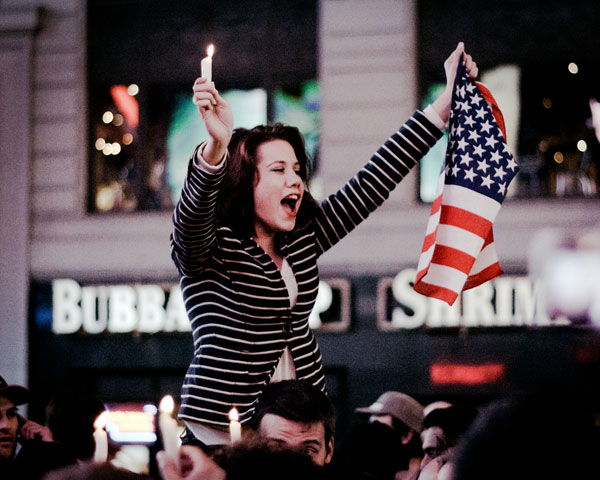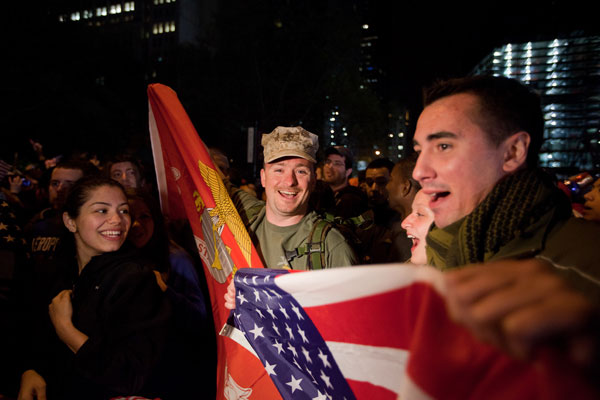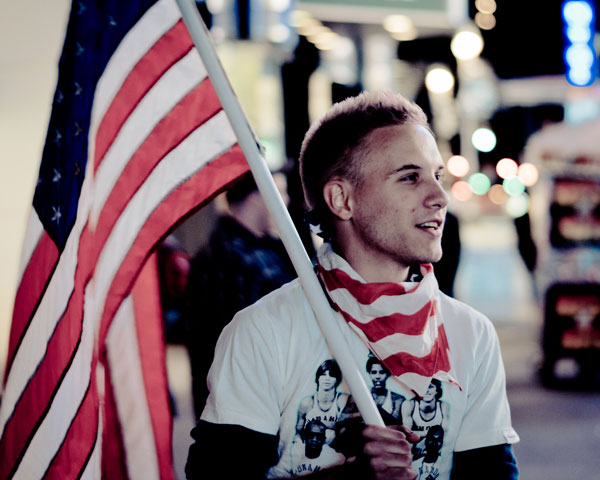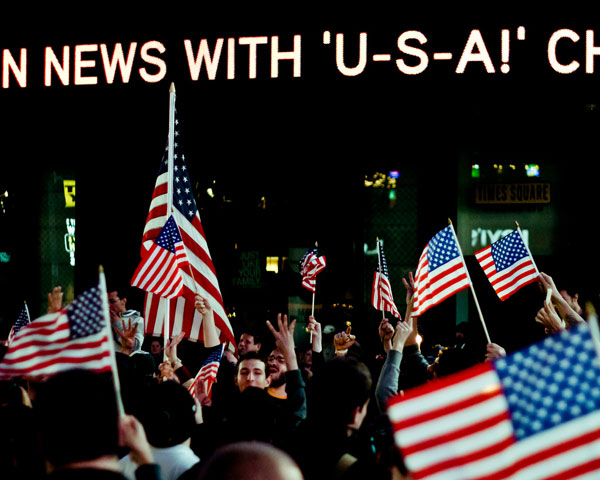There was one firework in my little corner of West Town/Humboldt Park last night; otherwise it was quiet. More quiet than when one of our sports teams wins a championship. I’ve heard of nothing like the scene in New York City, where the celebrations were going on throughout the night. I’m not sure I’ll ever fully appreciate what the news of Bin Laden’s death meant there, or in Washington, DC.




Is it okay to celebrate? That’s what someone was asking in the elevator this morning. Perhaps the reaction seems more dissonant here. As much as New York and Washington are expressions of the rest of the country, bin Laden’s death will be of local importance there in a way that it can’t be here.
I didn’t celebrate—I am not a very celebratory person, generally—but I did feel a profound sense of relief. Not because the death of bin Laden means a respite from the fear of terrorism. Quite the opposite, at least in the short term. My wife works in the Willis Tower, and is more worried today than she was Friday.
Instead, I think the relief stems from the fact that the ten years following 9/11 have felt like failure. Not just the failure to find bin Laden, but the two ongoing wars that were started in response to the terrorist act; the fact that Ground Zero remains a construction site; the still opaque anthrax attacks; the growing shadow and expense of the security state; Katrina, the devastation of another American city; the near-collapse of the economy; the ongoing human cost of high unemployment. It has been a low decade, in both symbolic and literal terms.
So I can’t help but think that the reaction last night comes out of a decade-long exhaustion with recent history, and the hope that it portends something better.
And it’s not just about the U.S. Marwin Bishara, writing for Al-Jazeera:
But for the Muslim world, bin Laden has already been made irrelevant by the Arab Spring that underlined the meaning of peoples power through peaceful means.
It is also worth recalling that bin Laden’s al-Qaeda and its affiliates have killed far more Arabs and Muslims than they did Westerners.
And it was only after they failed to garner real support in the Arab world that they ran back to Afghanistan and began to target the West.
After long hijacking Arab and Muslim causes through its bloody attacks on Western targets, al-Qaeda has been discredited since 9/11 and its organisational capacity diminished by Western counter terror measures.
Nor can it be separated from a more hopeful sense of unrest in the Middle East, as Juan Cole writes:
The Arab Spring has demonstrated that the Arab masses yearn for liberty, not thuggish repression, for life, not death and destruction, for parliamentary democracy, not theocratic dictatorship. Bin Laden was already a dinosaur, a relic of the Cold War and the age of dictators in which a dissident such as he had no place in society and was shunted off to distant, frontier killing fields. The new generation of young Arabs in Egypt and Tunisia has a shot at a decent life. Obama has put the US on the right side of history in Tunisia, Egypt, Syria and Libya (where I see crowds for the first time in my life waving American flags).
Among other expressions of hope: the hope that America will quickly draw down its presence in Iraq and Afghanistan, as expressed by veteran journalist James Fallows:
[If] this admittedly symbolic victory in the "war" can be taken as closing a loop opened ten years ago (and earlier, with previous OBL-inspired attacks), perhaps it could free us to continue the vigilance while beginning to correct the decade-long warping of our values.
And young journalist Matthew Yglesias:
The primary mechanism through which terrorism works as a tactic is fear and panic, and in an ideal world the emotional catharsis we saw around the country last night should be a chance to put things on a more sustainable footing.
It’s still early in the development of the story, but the organizational details of the location of bin Laden and the raid on his compound are extraordinary. Steve Coll:
After President Obama took office, he and the new Central Intelligence Agency director, Leon Panetta, reorganized the team of analysts devoted to finding Osama Bin Laden. The team worked out of ground-floor offices at the Langley headquarters. There were at least two-dozen of them. Some were older analysts who had been part of the C.I.A.’s various bin Laden-hunting efforts going back to the late nineteen-nineties. Others were newer recruits, too young to have been professionally active when bin Laden was first indicted as a fugitive from American justice.
And Mark Ambinder, with the most detailed account on the raid so far as it relates to structural changes in the Joint Strategic Operations Command:
The way JSOC solved this problem remains a carefully guarded secret, but people familiar with the unit suggest that McChrystal and Flynn introduced hardened commandos to basic criminal forensic techniques and then used highly advanced and still-classified technology to transform bits of information into actionable intelligence.
The soldiers who were on the raid will deservedly get credit for their bravery. But it’s worth a thought in your mind for the nerds and bean-counters:
Earlier this year, it seemed that the elite units would face the same budget pressures that the entire military was experiencing. Not anymore. The military found a way, largely by reducing contracting staff and borrowing others from the Special Operations Command, to add 50 positions to JSOC.
There is dissent this morning, against the celebratory reactions, that’s worth taking seriously. From the outstanding libertarian journalist Radley Balko, in a post entitled "He Won":
Yes, bin Laden the man is dead. But he achieved all he set out to achieve, and a hell of a lot more. He forever changed who we are as a country, and for the worse. Mostly because we let him.
And lawyer and writer Glenn Greenwald:
Whenever America uses violence in a way that makes its citizens cheer, beam with nationalistic pride, and rally around their leader, more violence is typically guaranteed. Futile decade-long wars in Iraq and Afghanistan may temporarily dampen the nationalistic enthusiasm for war, but two shots to the head of Osama bin Laden — and the We are Great and Good proclamations it engenders — can easily rejuvenate that war love.
Then again, America has fought both successful and unsuccessful wars; neither, historically, has dampened the enthusiasm for more.
What’s next: the continuation of the debate over torture and rendition:
Some of the detainees who confirmed the courier’s nickname were subjected to “enhanced interrogation techniques,” the CIA’s formal name for what’s now widely viewed as torture. That adds a moral ambiguity to a story that’s otherwise one of triumphal retribution and justice.
America’s relationship to our geopolitical frenemies in Pakistan:
American officials are fully aware of the double-game, and to say it frustrates them would be an understatement. For a decade, Pakistan’s role has been one of the great unmovable paradoxes of America’s war.
And a re-evaluation of our presence in Afghanistan:
Bin Laden’s hideout was not Afghanistan but Pakistan—“deep inside Pakistan,” President Obama said in making his midnight announcement from the East Room of the White House. That is to say, bin Laden’s place of refuge was not the country where we have been at war for a decade but a country with which we are nominally allied.
Long reads on bin Laden, via Longform.org:
"Young Osama: How he learned radicalism, and may have seen America." Steve Coll, New Yorker, 12/12/05
"Greetings, America. My Name is Osama Bin Laden: A conversation with the most dangerous man in the world." John Miller, Esquire, 2/1/99
"The Battle for Tora Bora: How Osama bin Laden slipped from our grasp: the definitive account." Peter Bergen, The New Republic, 12/22/09
"The Revolt of Islam: When did the conflict with the West begin, and how can it end?" Bernard Lewis, 11/19/01
Video: inside the grim compound the day after; the fire during or immediately after.
Photographs: Josh Pesavento (1, 3, 4), NYC Marines (CC by 2.0)



